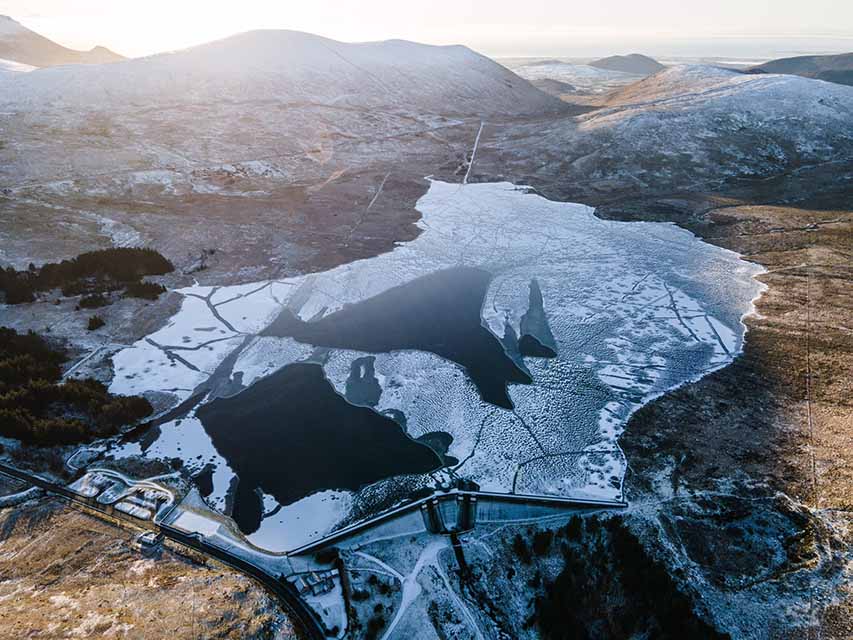NI Water says don’t walk or skate on thin ice
Iced-over and frozen reservoirs and dams can be a dangerous and fatal attraction.
This is specially true particularly for children, warns NI Water.
As temperatures remain below freezing, do not be tempted to stray on to the ice which has formed on reservoirs and dam or over any deep water.

How I Nearly Drowned In A Frozen Over Quarry Says Jim Masson
Jim Masson said: “When I was 12, I moved to a new home on the outskirts of the city I lived in. Close by there was a deep quarry filled with water.
“That winter it froze over. My friends and I decided to visit the quarry and skate on the ice. It was a new and exciting experience for me, and nearly my last.
“As I walked over the ice, it suddenly cracked and the large slab below my feet started to tilt to around 30 degrees.
“By that time I had sprung onto the face of the quarry wall, almost smooth. Somehow, my fi/nernails desperately managed to get a hold and I stopped myself temporarily from sliding down, down into the freezing water. A cold grave. Slowly the sheet of ice levelled off again and I tentatively tested my weight on it.
“It held ok. I took a deep breath and bounded over the loose piece of ice and over the rest of the ice to safety. I never looked back. I remember the high cliff looking down over me, and the grey freezing water lapping at my feet.
“I could have slid below the ice and the slab could have covered me over, quietly, not to be be found for days or weeks after. It was a scary experience. I was very lucky to survive that ordeal.”
Don’t play on frozen waters. You are not likely to get two chances like me!
Don’t Take Chances On Ice Says An NI Water Manager
NI Water Facilities Manager Patricia McKee says: “Taking a walk on a crisp cold day can be very refreshing but there can be dangers, particularly if temperatures dip and open waters freeze over.
“People, particularly children, assume the ice is thick enough to play on and walk or skate over, when however it is not.
“Ice can be thin in places and as we draw off water for production, the water level will drop away from the ice layer.
“This combination heightens the risk of someone falling through the ice into the freezing water. If this happened, there is a very real risk of someone drowning.
“NI Water needs the community to help and support us in maintaining public safety and to please ensure children are warned about the dangers of playing on ice.
“We don’t want to spoil anyone’s fun, but we are reminding adults to act responsibility around watercourses and asking parents to keep their children safe.
“Stay a safe distance from water edges because accidents can happen and without extra care you could slip and fall in.
“Dog owners also need to remember to keep four-legged friends on a lead if they are being walked near reservoirs and other bodies of open water.”
Patricia also advised on the vulnerabilities of remote locations: “Many of our sites are some distance from towns, villages and main roads, and often have poor mobile phone reception due to their location.
“This remoteness could hamper or delay rescue attempts if anyone gets into trouble – if there is any severe winter weather, those delays could be even longer.
‘‘As winter continues it is very important that everyone takes heed of the warnings and stays safe around NI Water sites. Don’t take the risk; play safe and stay safe.’’
The dangers of water include:
- Dangerously cold temperatures
- Hidden currents and outlet pipes: there can be strong underwater currents, which can trouble even the most confident of swimmers. Powerful suction from these hidden outlet pipes can have disastrous consequences for those attempting to swim or play around reservoirs.
- Reservoirs are often very deep: it is difficult to estimate depth and they can be deeper than you expect.
- There may be hidden debris or underwater hazards which can cause injury, including weeds and plants, which can entangle you under the water.
- It can be very difficult to get out (steep, slimy banks).
- There are no lifeguards on duty.
























